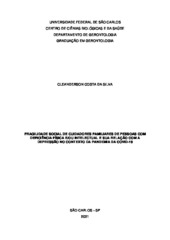| dc.contributor.author | Silva, Cleanderson Costa da | |
| dc.date.accessioned | 2022-04-26T00:27:30Z | |
| dc.date.available | 2022-04-26T00:27:30Z | |
| dc.date.issued | 2021-12-15 | |
| dc.identifier.citation | SILVA, Cleanderson Costa da. Fragilidade social de cuidadores familiares de pessoas com deficiência física e/ou intelectual e sua relação com a depressão no contexto da pandemia da COVID-19. 2021. Trabalho de Conclusão de Curso (Graduação em Gerontologia) – Universidade Federal de São Carlos, São Carlos, 2021. Disponível em: https://repositorio.ufscar.br/handle/ufscar/15918. | * |
| dc.identifier.uri | https://repositorio.ufscar.br/handle/ufscar/15918 | |
| dc.description.abstract | Social frailty is the decline in social relationships and social support that are directly linked to the determinants of the life course, which are age, education, income, gender, ethnicity, marital status, residential environment, lifestyle, life events and biological (GOBBENS, ASSEN, 2010). Thus, the need for care becomes a highly relevant factor to people with disabilities. On the other hand, the observed needs require caregivers, mostly informal, mainly family members. The process of caregiving can generate overload to the caregiver and also symptoms of depression. This process can be intensified due to the social changes caused by the COVID-19 pandemic. Thus, the present study aimed to evaluate the social fragility of family caregivers of people with physical and/or intellectual disabilities and its relation with depression in the context of the COVID-19 pandemic. This is a descriptive, correlational, cross-sectional research with a quantitative approach. Thirty-one individuals from a Non-Governmental Organization (NGO), located in the countryside of the State of São Paulo, participated in the research. The instruments Sociodemographic and Economic Characterization, the HALFT scale and the PHQ-2 (Patient Health Questionnaire-2) were applied; Among the results, most were male (56.70%), without a steady partner (61.30%), white (76.70%), with incomplete elementary school education (54.80), 35.5% of the participants self-assessed their health as good. Regarding frailty, 61.5% (n= 19) and 32.0% (n=10) were socially frail and pre frail, respectively. Regarding depression, 35.5% of family caregivers had probable depression. There was strong and statistically significant correlation between HALFT and PHQ-2 (r=0.604; p<0.001). It can be concluded that the level of social fragility and depression of family caregivers of people with Physical and/or Intellectual Disability was high and a strong relationship between social fragility and depression was confirmed. | eng |
| dc.description.sponsorship | Não recebi financiamento | por |
| dc.language.iso | por | por |
| dc.publisher | Universidade Federal de São Carlos | por |
| dc.rights | Attribution-NonCommercial-NoDerivs 3.0 Brazil | * |
| dc.rights.uri | http://creativecommons.org/licenses/by-nc-nd/3.0/br/ | * |
| dc.subject | Fragilidade social | por |
| dc.subject | Cuidador | por |
| dc.subject | Deficiência física | por |
| dc.subject | Deficiência intelectual | por |
| dc.subject | Depressão | por |
| dc.subject | COVID-19 | por |
| dc.title | Fragilidade social de cuidadores familiares de pessoas com deficiência física e/ou intelectual e sua relação com a depressão no contexto da pandemia da COVID-19 | por |
| dc.title.alternative | Social frailty of family caregivers of people with physical an/or intellectual disability and relation to depression in the context of the covid-19 pandemic | eng |
| dc.type | TCC | por |
| dc.contributor.advisor1 | Orlandi, Fabiana de Souza | |
| dc.contributor.advisor1Lattes | http://lattes.cnpq.br/7395879552721664 | por |
| dc.contributor.advisor-co1 | Santos, Diana Gabriela Mendes dos | |
| dc.contributor.advisor-co1Lattes | http://lattes.cnpq.br/9600314960182339 | por |
| dc.description.resumo | A fragilidade social consiste no declínio das relações sociais e do suporte social que estão diretamente ligados aos determinantes do curso de vida, sendo eles a idade, educação, rendimento, sexo, etnia, estado civil, ambiente residencial, estilo de vida, eventos de vida e biológicos (GOBBENS, ASSEN, 2010). Desta forma, a necessidade do cuidado se torna um fator de suma relevância às pessoas com deficiência. Em contrapartida, para as necessidades observadas faz-se necessário cuidadores, em sua maioria informais, principalmente familiares. O processo de cuidado pode gerar sobrecarga a quem presta o cuidado e também sintomas de depressão. Esse processo pode ser intensificado devido às alterações sociais causadas pela pandemia de COVID-19. Desta forma, o presente estudo teve como objetivo avaliar a fragilidade social de cuidadores familiares de pessoas com deficiência física e/ou intelectual e sua relação com depressão no contexto de pandemia da COVID-19. Trata-se de uma pesquisa descritiva, correlacional, transversal, com abordagem quantitativa. Participaram da pesquisa 31 indivíduos de uma Organização Não Governamental (ONG), situada no interior do Estado de São Paulo. Foram aplicados os instrumentos de Caracterização Sociodemográfica e Econômica, a escala HALFT e o instrumento PHQ-2 (Patient Health Questionnaire-2); Dentre os resultados, a maioria era, sexo masculino (56,70%), sem parceiro fixo (61,30%), branco (76,70%), com ensino fundamental incompleto (54,80), 35,5% dos participantes autoavaliaram a saúde como boa. Em relação à fragilidade, 61,5% (n= 19) e 32,0% (n=10) eram frágeis e pré frágeis socialmente, respectivamente. Quanto à depressão, 35,5% dos cuidadores familiares tinham provável depressão. Houve correlação forte e significante estatisticamente entre a HALFT e o PHQ-2 (r=0,604; p<0,001). Pode-se concluir que foi elevado o nível de fragilidade social e depressão dos cuidadores familiares de pessoas com Deficiência Física e/ou Intelectual e confirmou-se forte relação entre a fragilidade social e a depressão. | por |
| dc.publisher.initials | UFSCar | por |
| dc.subject.cnpq | CIENCIAS DA SAUDE | por |
| dc.publisher.address | Câmpus São Carlos | por |
| dc.contributor.authorlattes | http://lattes.cnpq.br/5120041739941217 | por |
| dc.publisher.course | Gerontologia - Gero | por |

